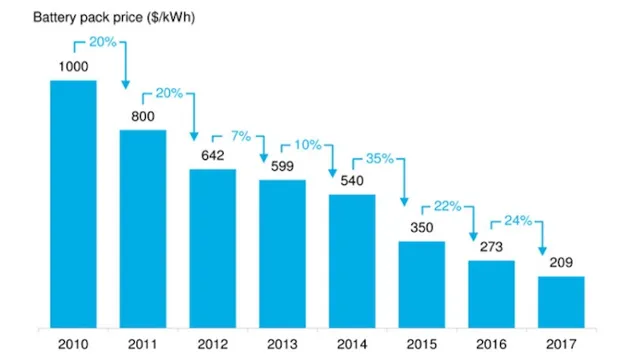Unleashing the Truth: How Long Do Electric Car Batteries Really Last?
Electric cars are becoming increasingly popular as people look for more environmentally-friendly transportation options. However, one of the biggest concerns for potential electric car buyers is the battery’s life expectancy. Unlike gasoline cars that can run for years with minimal maintenance, electric cars rely on lithium-ion batteries that deteriorate over time.
This raises questions about how long an electric car battery lasts and what factors contribute to its lifespan. In this blog, we will explore the ins and outs of electric car batteries, discuss the factors that affect their longevity, and provide tips to extend their life expectancy. So, buckle up and let’s dive in!
Overview
When it comes to electric car batteries, the average miles they can last before needing to be replaced can vary greatly depending on numerous factors such as make and model, battery technology, and driving habits. On average, most electric car batteries can last between 100,000 to 200,000 miles before needing replacement. However, it is important to note that this is just an estimate and certain factors such as extreme temperatures or frequent fast charging can significantly reduce the lifespan of the battery.
Additionally, advancements in battery technology are constantly being made so it is possible that the lifespan of electric car batteries may continue to improve in the future. Ultimately, it is important for electric car owners to pay attention to battery health and charging patterns to ensure that they get the most out of their electric vehicle.
Understanding Electric Car Battery Life
Electric Car Battery Life Electric cars are becoming more prevalent in our society. One of the most important components of these vehicles is the battery. Understanding electric car battery life is crucial in ensuring the longevity and efficiency of your electric vehicle.
The lifespan of an electric car battery varies depending on the type of battery and how it is used. Lithium-ion batteries are the most common batteries used in electric cars and typically last between 8 to 10 years. However, this lifespan can be affected by factors such as extreme temperatures, usage patterns, and maintenance.
It is recommended to keep your battery between 20% to 80% charged and to avoid charging it to 100% or letting it drain completely. Proper maintenance and care can help to extend your battery’s lifespan and ensure your electric vehicle runs smoothly.

Factors Affecting Electric Car Battery Life
Electric car battery life can be affected by various factors that impact the efficiency, range, and longevity of the battery. The main factor is the temperature at which the car is operated and charged, as extreme temperatures can cause degradation of the battery and reduce its lifespan. Other factors include driving habits, such as frequent acceleration and braking, which can also lead to faster battery degradation.
The type of battery also plays a significant role, as different chemistries have different performance and lifespan characteristics. Regular maintenance and proper charging practices can help mitigate some of these factors and prolong the life of the battery. As more people opt for electric cars for their environmental and economic benefits, understanding and managing these factors will continue to be critical for maximizing the benefits of electric vehicle ownership.
Average Miles on Electric Car Batteries Before Replacement
When it comes to electric car batteries, one of the biggest concerns is their lifespan and how long they last before needing to be replaced. On average, electric car batteries can last anywhere from 100,000 to 200,000 miles before needing to be replaced. However, this can vary depending on the quality of the battery and how well it is maintained.
For example, if you frequently charge your battery to 100% or let it drain completely before charging, it can decrease the lifespan of the battery. On the other hand, if you regularly maintain the battery and only charge it when necessary, it can extend its lifespan. Additionally, the type of electric car you have can also impact the lifespan of the battery.
Generally, more expensive electric cars tend to have higher quality batteries that last longer. Overall, while the average lifespan of an electric car battery is impressive, it’s important to take proper care of it to ensure it lasts as long as possible.
Data on Electric Car Battery Life Expectancy
When it comes to electric car battery life expectancy, it’s important to consider a few factors that can affect the overall durability of the battery. According to recent data, the average lifespan of electric car batteries ranges from 7 to 10 years, or about 100,000 miles before they need to be replaced. However, this lifespan can vary depending on how the owner uses and maintains their electric car.
Factors such as temperature, charging habits, and driving style can play a significant role in how long the battery will last before it needs to be replaced. It’s important to regularly monitor the health of your electric car battery to ensure it’s performing at its best and to make any necessary adjustments to your charging habits and driving style to extend its life. By doing so, you can make the most out of your electric vehicle and enjoy all the benefits of a sustainable and efficient mode of transportation.
Manufacturer-Specific Battery Life Information
When it comes to choosing an electric car, one important consideration is the battery life and how many miles it can travel before needing replacement. The average lifespan of an electric car battery varies depending on the manufacturer. For example, Tesla claims their batteries should last up to 300,000 miles before needing replacement, while Nissan’s Leaf has an average lifespan of 100,000 miles.
Other factors, such as driving habits and environmental conditions, can also affect battery life. It’s important to do your research and consider all factors before making a decision on an electric car. Fortunately, as technology continues to improve, the lifespan of electric car batteries is expected to increase in the future.
Battery Replacement Costs for Electric Cars
Electric car batteries are the lifeblood of an electric car and the cost of replacement can make a big dent in your wallet. On average, electric car batteries can last anywhere from 100,000 miles to 200,000 miles before they need to be replaced. However, this can vary greatly depending on the make and model of the car, as well as how often the car is charged and how it is driven.
The cost of replacing an electric car battery can range from $3,000 all the way up to $20,000, depending on the make and model of the car. For example, the cost to replace a Nissan Leaf battery is currently around $5,500, while the cost to replace a Tesla Model S battery can go up to $20,000. It’s important to keep in mind that while the initial cost of an electric car may be higher than a traditional gas-powered car, the savings from not having to buy gas and lower maintenance costs can make up for it in the long run.
Maximizing Your Electric Car Battery Life
If you’re looking to purchase an electric car, one of the primary concerns you may have is the lifespan of the battery. After all, the cost to replace an electric car battery can be quite steep, with prices ranging from $5,500 to $16,000. On average, electric car batteries last around 100,000 miles before needing to be replaced.
However, there are steps you can take to maximize the lifespan of your battery. One tip is to avoid exposing your car to extreme temperatures, both hot and cold, whenever possible. Heat can cause the battery to degrade faster, while cold temperatures can reduce the battery’s capacity.
Additionally, experts recommend avoiding fast charging whenever possible as it can put additional strain on the battery. By taking these precautions and following manufacturer recommended maintenance guidelines, you can extend the lifespan of your electric car battery and get the most out of your investment.
Tips for Prolonging Electric Car Battery Life
Electric Car Battery Life If you’re an electric car owner, prolonging your car battery life should be a top priority to maximize your driving range and save costs on battery replacements. Here are some tips to help you maintain your electric car’s battery and get the most out of it. First, avoid overcharging your battery as this can lead to heat buildup and damage the battery cells over time.
Secondly, limit your use of fast charging as it puts additional strain on the battery. Thirdly, maintain a regular charging routine to keep the battery cells balanced and healthy. Last but not least, avoid exposing your battery to extreme temperatures to prevent thermal degradation.
By taking these simple steps, you can extend your electric car’s battery life and enjoy more driving time on a single charge.
Maintenance and Care for Electric Car Batteries
As electric cars become more popular, understanding the maintenance and care of their batteries is crucial. Maximizing the life of an electric car battery is essential for optimizing your vehicle’s performance and your overall driving experience. Some simple steps can help you extend your battery life, such as keeping the battery charged between 20% to 80%, avoiding extreme temperatures, and limiting the use of fast chargers.
Additionally, scheduling regular maintenance and working with a certified technician to diagnose any problems can help prolong the battery’s life even further. By taking these steps, you can ensure that your electric car battery lasts for years, providing a reliable and efficient power source for your vehicle. So, take the appropriate steps to maximize your electric car battery life, and enjoy the many benefits that come with driving an electric car.
Conclusion
In conclusion, the average miles of an electric car battery at replacement isn’t just a number, it’s a reflection of the incredible strides we’re making in sustainable transportation. While it’s true that battery technology is still evolving, it’s never been easier or more affordable to drive an electric car with a range that can take you wherever you need to go. So if you’re in the market for a new car, why not join the electric revolution and see just how far you can go?”
FAQs
FAQ 1: Q: What is the average mileage of electric car batteries at the time of replacement? A: The average mileage of electric car batteries at the time of replacement varies depending on the model and usage, but it is generally between 100,000 to 150,000 miles. FAQ 2: Q: How often do electric car batteries need to be replaced? A: Electric car batteries typically last for 8 to 10 years or around 100,000 to 150,000 miles, but this can vary depending on the make and model of the vehicle and the usage. FAQ 3: Q: Can electric car batteries be reconditioned or refurbished instead of replaced? A: Yes, it is possible to recondition or refurbish electric car batteries, which can extend their lifespan and save on replacement costs. However, this process can be expensive and may not be a practical solution for all situations. FAQ 4: Q: How does the mileage of electric car batteries compare to those of petrol or diesel cars? A: The mileage of electric car batteries is generally higher than that of petrol or diesel cars, with some models able to travel up to 300 miles on a single charge. However, the range and performance can vary depending on factors such as driving style, weather conditions, and the size and capacity of the battery.






